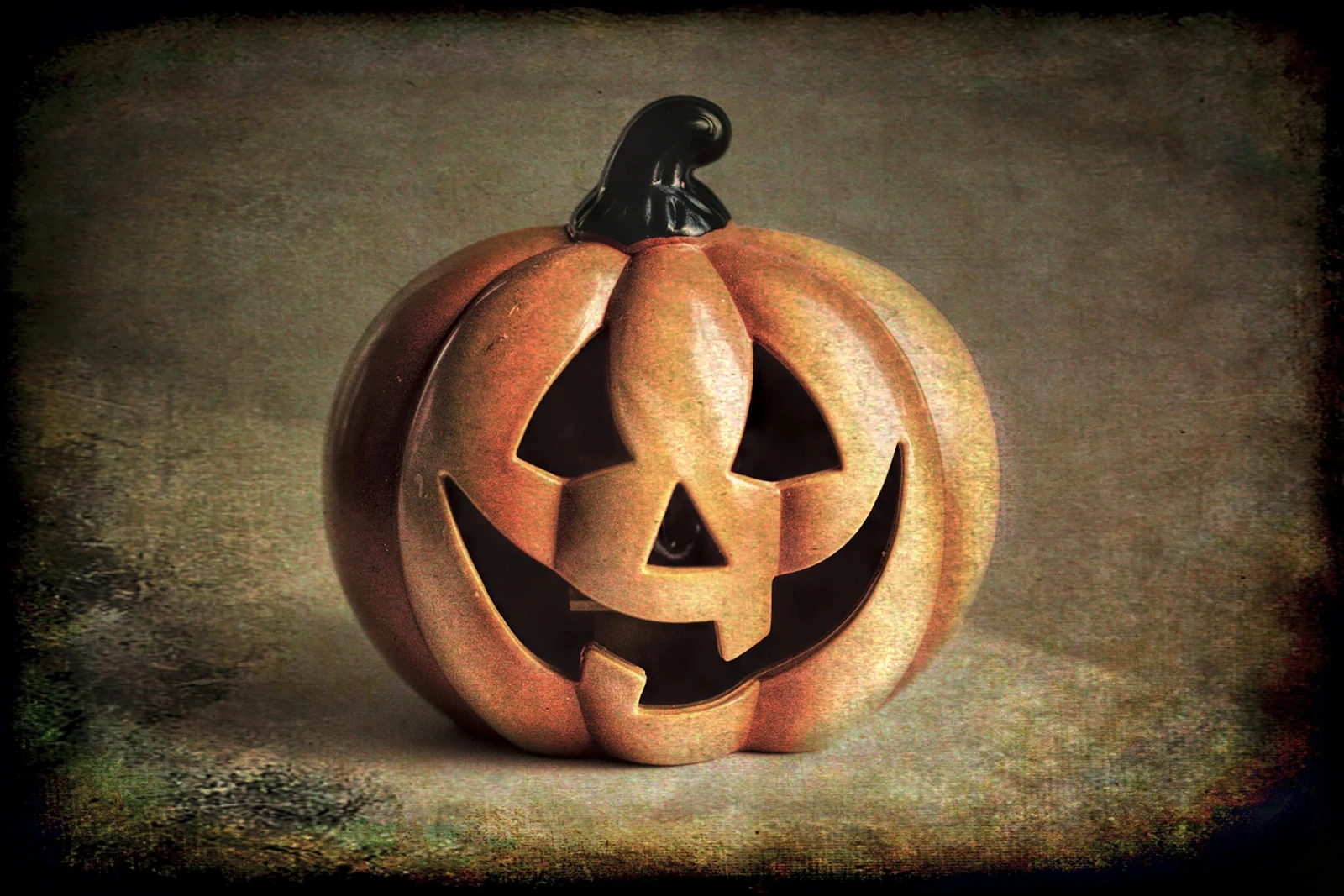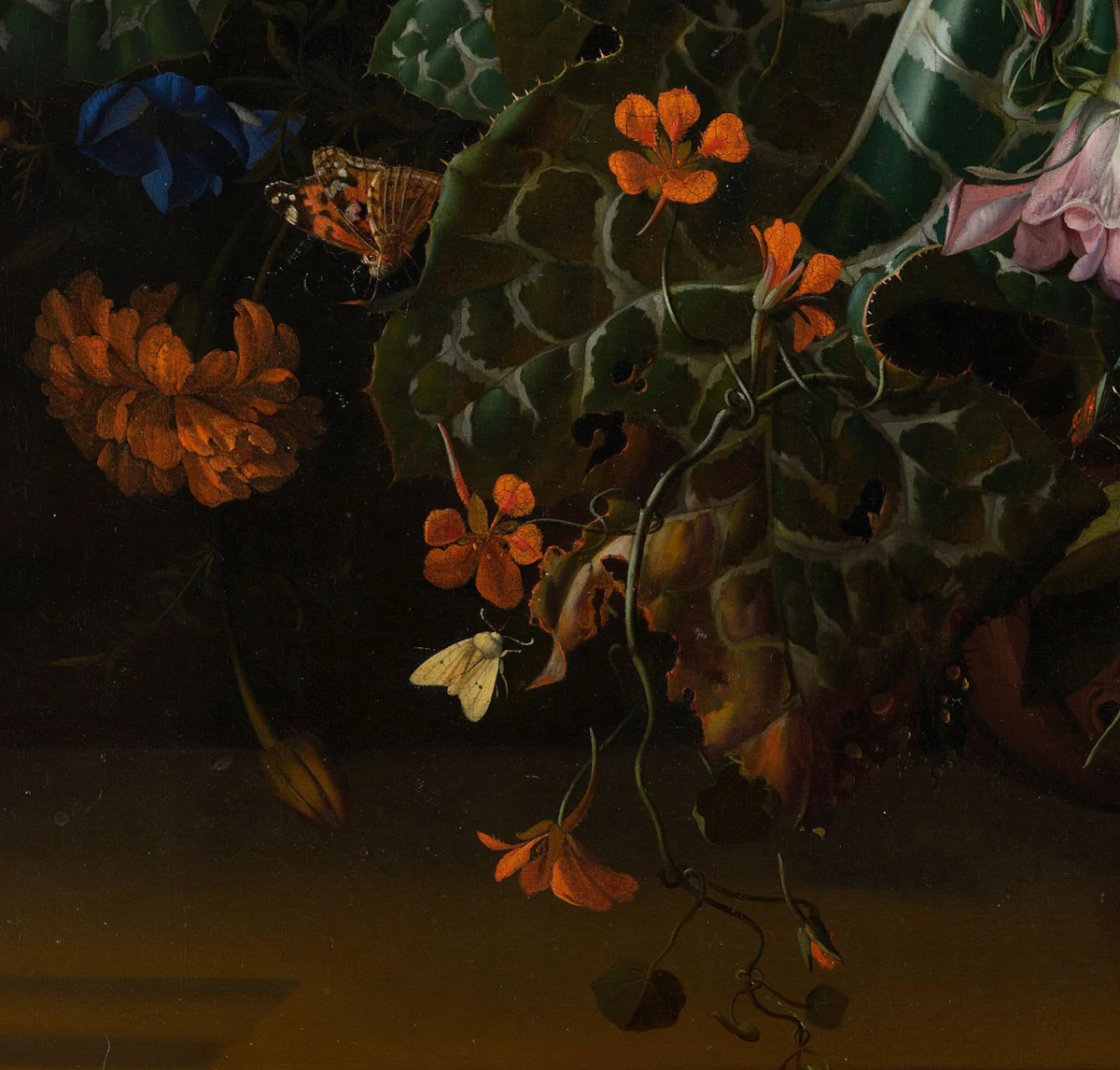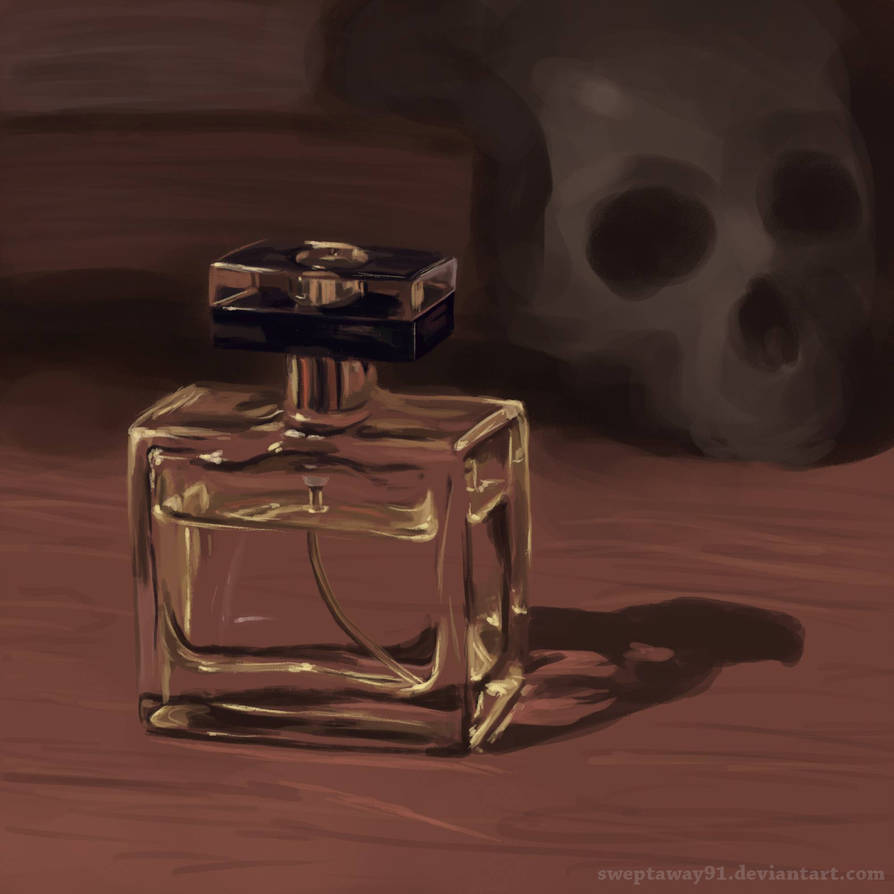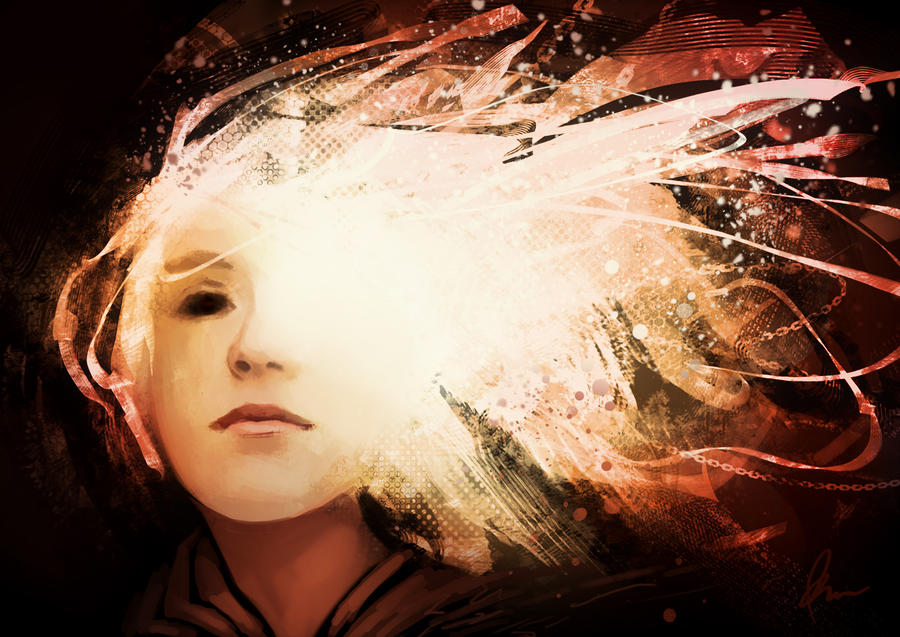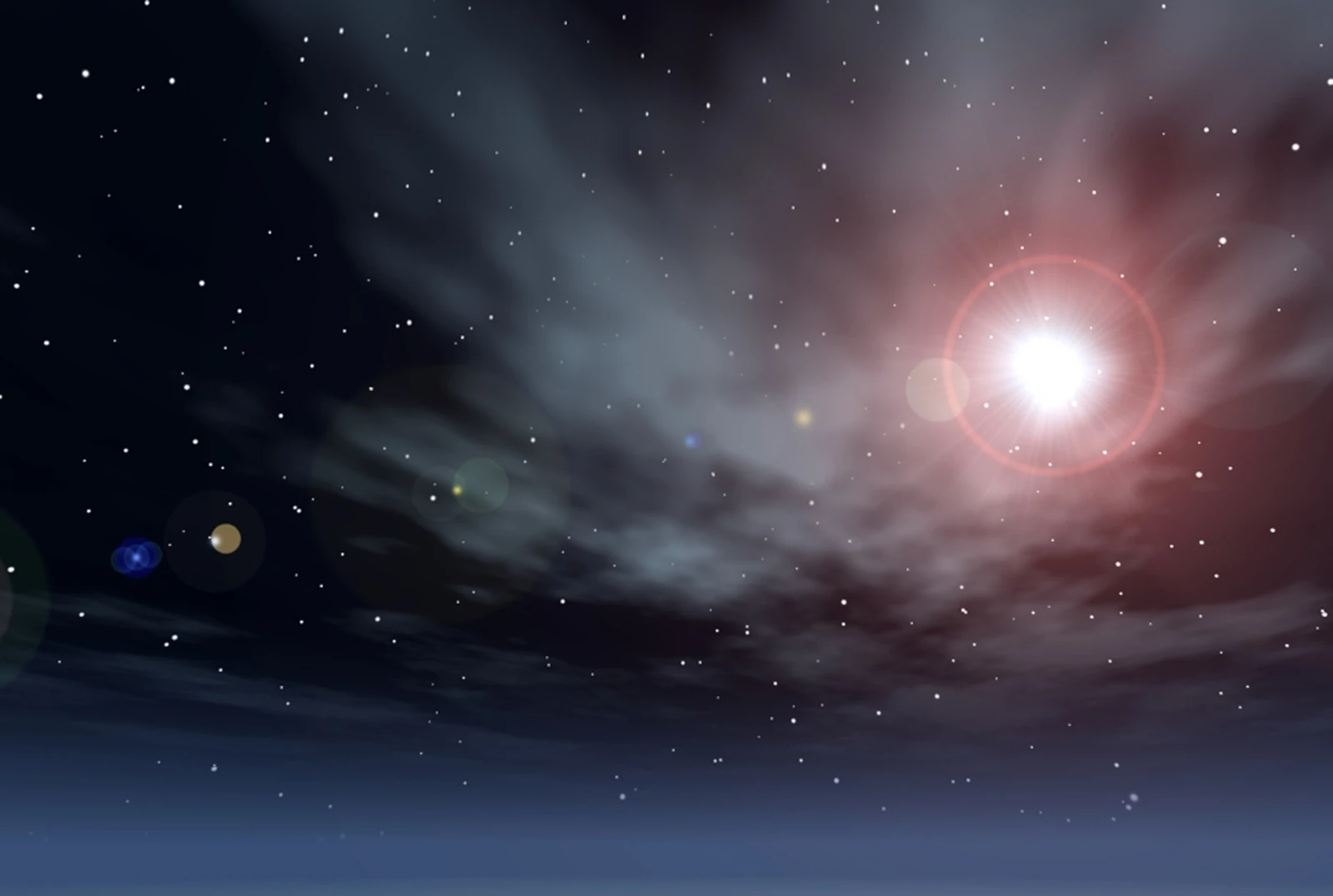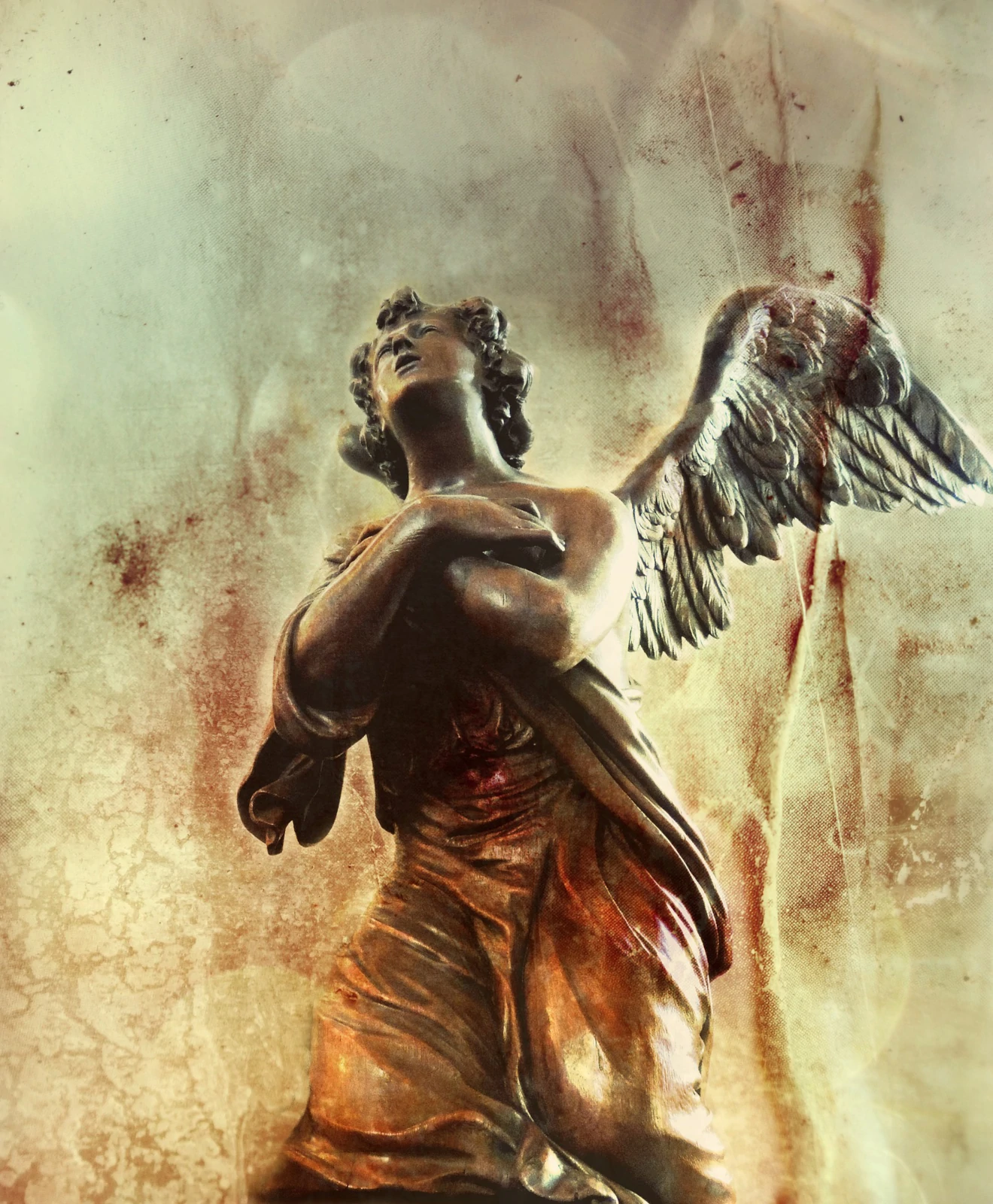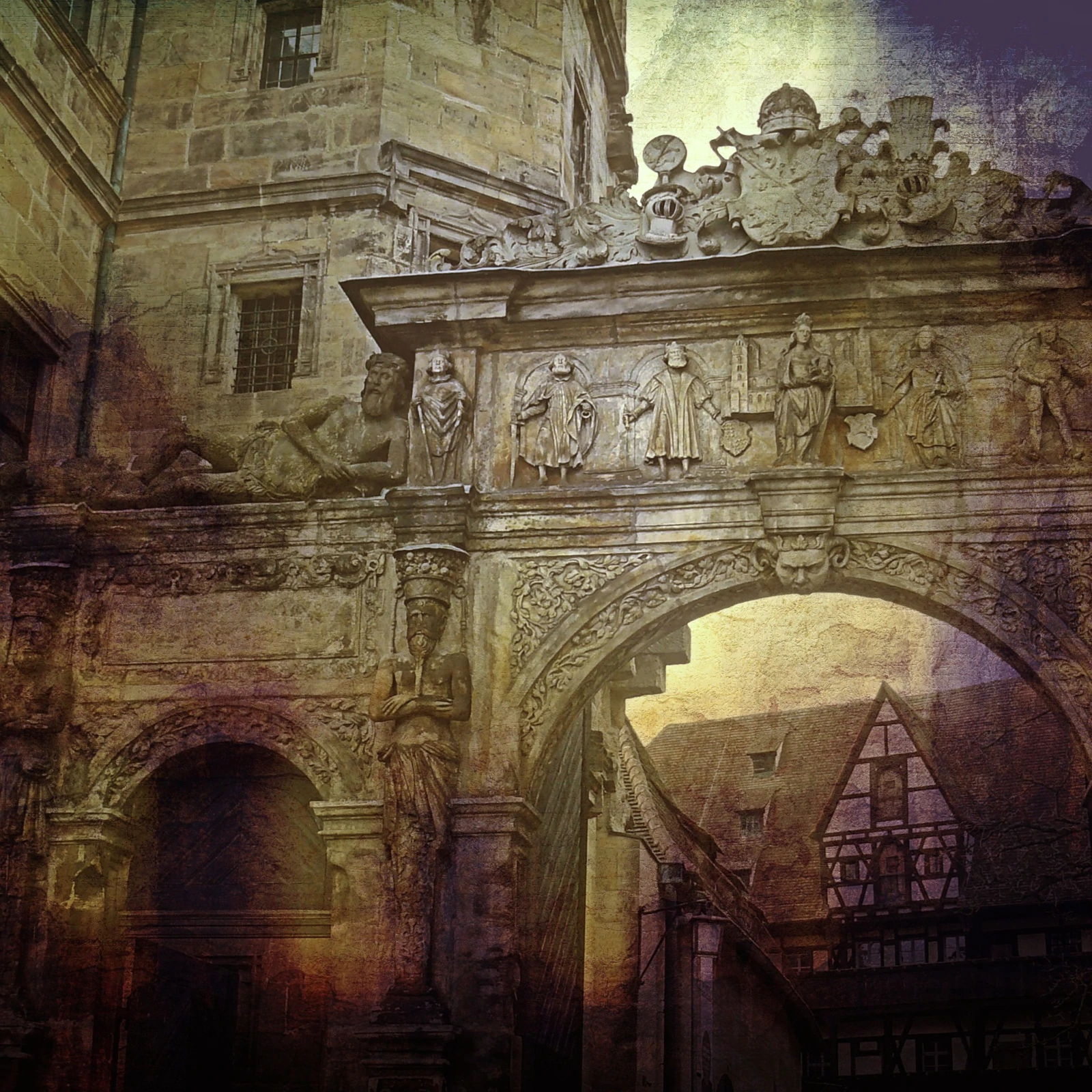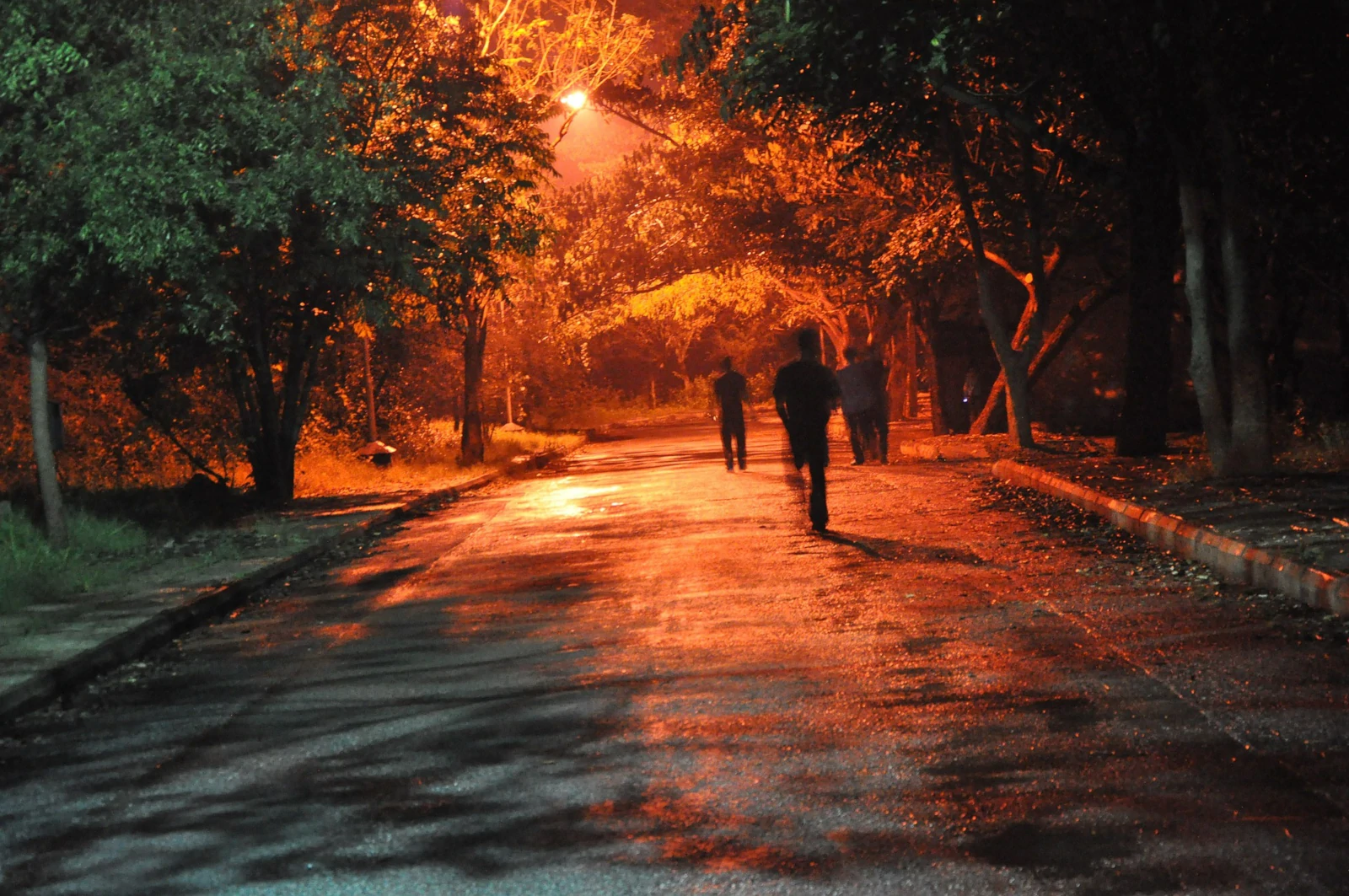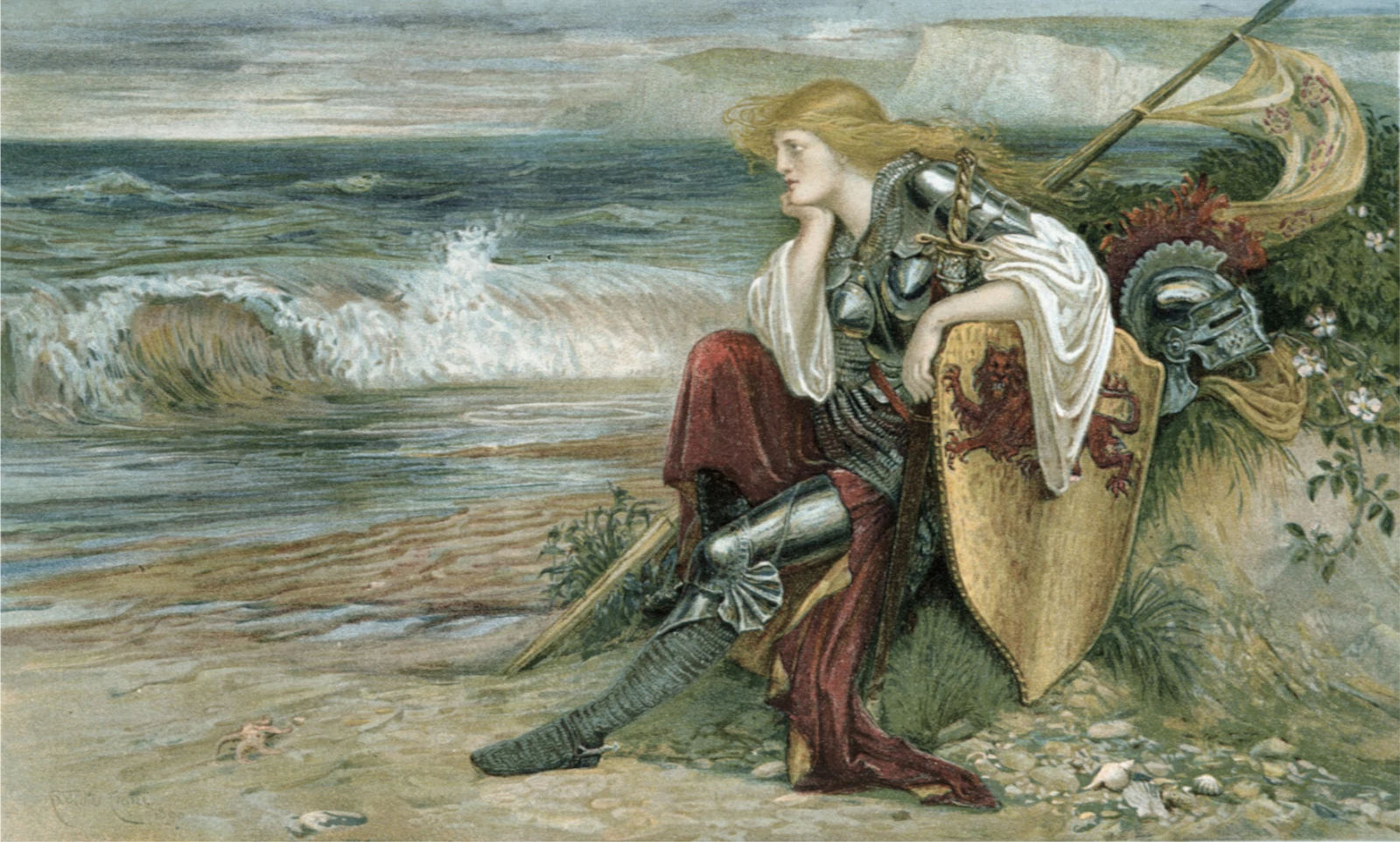From the pale-lit hallway, Jeff could hear his date bustling inside her apartment for half a minute before he knocked again and she opened the door. She was beautiful, small and slim, with dark hair and straight-across bangs, nicely modest-chested. Her brown eyes called out with long lashes against the deathly pallor of her ashen-white face and arms. Wounds gristly with rot desecrated her skin, a scar gaping the length of one cheek. Her blood-soaked clothes were grimy and ripped.
“Hey!” She flashed the concessionary smile of someone in the middle of important work, ushering him inside. He followed her, shutting the door behind them.
“Lookin’ good!” he said generously, admiring the remains of her nurse’s uniform. The dirty and frayed fabric. Distressed slit up one side of her miniskirt. The running tights that, where split open up and down her legs, showed the black-bloody holes of hot-iron torture.
Jenna glanced absently behind her—“Oh, it’s whatever”—as they passed from the entry hallway into the kitchen. It was a high-ceilinged space with yellow tile, new chrome refrigerator, decades-old olive paint on the cabinets. On the cracked green counter, a minor refinery of bottles with bright labels blared beside a double stack of red plastic cups, a mixer, bottle opener, tumbler with a mini-mountain of cubed ice.
What did he want?
“Anything.” Jeff laughed. He accepted a can of Miller Light, igniting the hiss-crack of the lid. Music pounded subtly in the next room, Ladytron or MNDR or somebody like that. He pointed to the spread of alcohol. “Think y’got enough?”
“I’m mixin’ stuff to take with us.” She leaned coolly against the counter, right hand clutching a red cup at a nonchalant dangle. “Mel’s coming. So’s Dave, maybe Cary.” Her eyes fell over his outfit, the old black work slacks he’d torn for this occasion and the blood-dappled white dress shirt, untucked. “Really s’posed to be a doctor?”
He surveyed his getup. “Medical technician. Fixin’ the x-ray when they broke through the barricade. Jesus!” he mock-pleaded to the ceiling, “The screams!”
She put her cup down and found a peeling knife on the counter.
A thought flashed through him. Maybe she heard about the deliberations he’d had with his friends about dumping her. She was going to carve him up. Why the hell not?
Her grin disarmed him as she stepped close, tugging his right sleeve taut and spearing the fabric with her knife. She jerked the blade down over his upper arm, tearing the sleeve cleanly with a whispered snicker of fabric. He watched her scrutinize this task.
Returning the knife to the counter, she took the sleeve in her hands, her ruby-red nails, yanking the shirt open with a decisive rip. He tingled. She stepped back to admire her work, a squint and shrug: “Probably could use more gore.”
“Y’got extra gore?”
“We got gore.”
“Who’s that playing—Metric?”
“Ladytron.”
“Cool.”
They were close, machinery of unexpected seduction whirring up, the two vodka cocktails he’d had at home and the drinking now and the music and her outfit, and he warmed with the need to kiss her, cup the back of her neck beneath her hair, pull her tight against him. Her sultry eyes and sardonic half-grin and the carnal liberation of destroyed clothing, bloody makeup, the minor thrill of being someone else.
“You’re gorgeous,” he hushed.
A rattling growl from somewhere in the kitchen stole her glance. She stepped back, looking around. There, her phone, nestled among the bottles of liquor.
She looked at the number and brightened. “It’s Mel!” And into the phone: “Hey!”
He nodded, meandered with his drink into the living room. In his benevolent banishment, set to music, something felt somehow wrong. Not quite that the place was haunted, but that a force was here, or out there across town with ways to get in. Something stalked Jeff, a spirit to entice his discomfort, or…
Or something worse.
The apartment was spare, old plaster walls, hardwood floor, cheap black futon-esque couch and matching easy chair. It was just Jenna and her roommate Mel in this 80-year-old place that bore the hallmarks of that post-collegiate transition into corporate jobs that still allowed for—maybe encouraged—drunken crusades with gaggles of friends at piano bars and Irish pubs, tiki huts and techno clubs. Some nights ended on the couch.
He gave the couch a wincing glance, the meaningless regret now of kissing, fondling her under her bra just a week and a half earlier as the TV beside the fireplace showed some Oscar-nominated cop drama they mostly ignored. He pressed on, hands probing, until she dryly told him to stop and the moment was over.
He’d picked her up that night at the glass office complex where she worked as an account assistant for a mutual fund. She stood chatting in the airy atrium with co-workers, almost too beautiful to behold in her tight white blouse, top three buttons undone, her short black skirt, strap-back heels and a slip of hair tucked behind one ear. Jeff just wanted to look at her in various states of undress, listen to her dreams, invade her bare softness, plan trips with male authority, act like he knew about money. See a future with her despite whatever peripheral messiness waited to bubble up.
He shook his beer can, felt the soft percussion of the liquid that was left. Back in the kitchen for another drink, he ignored Jenna’s animated cackling on her phone, no wink for Jeff or smile or index finger to say this is almost over. Here he was on hold, in the living room again with his drink. The music, from a small deco stereo on the black IKEA cabinet, swelled and surged, synthesizers and beats, a pop chorus Jeff found himself drunkenly humming. Distracting himself from the sense of foreboding.
It was how she looked at him, or didn’t, or didn’t get his jokes, or didn’t want sex after four dates—something. It was worse because he’d known her in high school, or known who she was, two years behind him. So conversations about him she would have with her friends had added cache; they’d ricochet around social settings like a fucking pinball, assumptions about who he really was, how he really felt about her, her brother.
Stuart Robinson.
Framed on the fireplace, he had an arm slung around Jenna, brilliant soap opera smile, tall and tan, muscled in a red Hawaiian shirt. Stuart and Jenna: a family with the perfect geometry of faces and bodies, like actors and actresses, it was genetic, when a lightning bolt of beauty and personality and popularity shivered down through siblings and shocked the school into reverence. Stuart had been in student government in high school, just a few short years ago, whooping up the crowd with a megaphone on the floor of the cacophonous gymnasium: “Let me hear youuuuu!” Back when Jeff was just an awestruck freshman, never imagining he’d date this senior’s sister. “You guys’re pathetic—come on! You can’t just sit there’n be lovable! Y’got that spirit! Y’got that spunk! Let’s hear the men! Now the ladies! Let’s hear the ladies!”
Jeff was still a little surprised to have dated Jenna. Stuart, of course, could end things between them in an instant.
Four pictures over, Jenna’s fireplace showed Stuart in his golden high-school superiority, his camp counselor days, maybe his upwardly mobile intern-who-golfed days, when he could’ve had any girlfriend in the world but dated only two. That warm, sun-dappled smile he shared with Jenna. There he was in his Army fatigues, the mottled gray camouflage, hands clasped behind his back, beaming broad and assured.
Jeff tipped the rest of his beer into his mouth as he heard Jenna tell Mel goodbye.
They went downstairs, fruity alcoholic drinks hidden in her purse, and they stepped conspicuously outside, a narrow corridor of four-story condos and cars parked along the street. The early fall afternoon was hazy, air with a pleasant breeziness that cut through the humidity, the distant sound of traffic and music.
“What’s the charity again?” Jeff asked. Jenna, already imprudently unpacking their flasks, knew the organizers and had donated the canned food required to participate.
“Lung cancer, fibrosis, some shit,” she handed Jeff his flask. “Homeless fetuses.”
Up the sidewalk, an elderly woman with groceries gave a start when she spotted
Jeff and Jenna. They offered friendly hellos as they passed with barely restrained giggles. Across the street, a middle-aged couple chuckled at them and a block down, a group of kids fucking around with a basketball paused to check the zombies out.
Jeff took a slug of drink from his flask, wincing, downing another. He leaned over to Jenna. “Do arrest reports actually mention zombies? Probably you’re just drunk’n disorderly, right? With attempted murder? I guess that dude in Miami was a zombie.”
“Shit, man.” Her sips were conservative. “Zombies need public defenders too.”
Occasionally, he saw a flash of something in her that made him sympathetic. He could see it in her posture, her metabolism, the stress that comes with needing to sync your life and career with a timeframe—mortgage, husband, kids—all the uncertain things in the future. Like having a fifteen-year layover to Paris in the Atlanta airport and there’s still a chance you’ll miss your flight.
After a moment of just walking, drinking, Jeff knew he needed to say it. The words perched on his tongue, waiting for space amid the cars and clatter and horns of the city. “So how’s Stuart?”
“Good,” she said evenly, tone tinged with resigned uplift. “He’s my bro.”
“Gettin’ by okay?”
“Yep. My mom’s probably over there right now. He might actually come out.”
A ripple of discomfort hit Jeff. As in out here? Shit. “That’s good to hear.” This made everything exponentially more complicated.
“It’d be cool for him,” Jenna went on. “Y’know, do regular stuff.”
“It’s tough.”
“I know,” the words came out slightly stronger than a sigh, almost recited. “Freedom, helping people, all that stuff.”
“Yeah, I can understand that.” He swallowed, took a drink.
“Look!” She pointed to the intersection up the street: the zombies bunched and waiting patiently for the crosswalk signal.
“Actual zombies would just barge through,” Jeff said, thinking of the absurdity of it all, the almost unseemliness of it, this whole horde of bubbly people dressed up as mutilated wrecks. How they would scream and sob and forget this moment ever existed when something horrific happened for real. Maybe it was just Jeff’s sense of being thrust onstage in an unscripted play and meeting his fellow actors for the first time. Maybe the best thespians here felt a deeper connection to their roles. A certain respect for death.
Maybe he needed more to drink. The corrosive liquid tickled his throat. He suddenly wondered if he’d lost his ability to enjoy himself. The crosswalk signal changed and the zombies advanced.
“C’mon!” Jenna tugged him by a torn sleeve and they hurried along. They merged with the slow-moving mass of undead, few paying much attention, some moaning, hands outstretched, most getting into the act. In the cluster of ironically shambling youth—there were a few here in their fifties or older, but even they seemed young—mutilation was a valid, if not great, leveler when it came to age and weight. Here, jowls were offset by mock-torn tissue, jiggly thighs and calves barely inside shredded stockings.
Jeff let out a drunken laugh as Jenna grinned, rolled her eyes and belted a comical moan. He played with his gait, turning his legs sideways to scrape his feet along, trying to lose himself in the moment. Before the procession began, most of the zombies had let makeup artists craft their look in the park a few blocks away. The whole train of them now stumbled down the street, past storefronts and slow-moving traffic with the occasional thumping stereo and heavy-bus grumble, past the curious and amused stares of people who were part of this in their own way too. A chatting, laughing legion of the crazed and mutilated was a joke that maybe went on too long but was over-the-top enough to appreciate. A lone nut was dangerous, even deadly; a pack of nuts was practically a snack.
Jeff laughed to himself—horror. What did it mean anymore? Horror was movies, something you showed your girlfriend on a weekend afternoon for fun. Sure, it crossed into other realms, a loved one murdered with no culprit or motive. Plague with no escape. There were always fears, irrational, but imaginable. Loved ones taken away. But where in the spectrum of horror would Jenna’s kidnapping be—maybe she’s clawed down a manhole by a hairy creature? Her horror, Jeff’s horror, a community in shock. But then she’s rescued, ravaged but alive, saved by a strike force of hunky guys who go in after her. The chiseled team leader winning her desire, earning some hot Seal team sex. Jeff could feel his own horror in the space between his neck and chest. Horror was a lover’s attention switching to another. It was a mirage, something intangible, but sitting there so innocently in the dictionary. A word tainted with laughter and fantasy. Zombies.
“—nomads, but they’re communal creatures,” a male voice was saying.
Another voice said, “Who’s Zombie Zero? The first one?”
“Your mother’s a communal creature.”
“Oh shit! Now it’s on.”
“—Amy H. or Amy J. again?” a girl’s voice overlapped, another conversation.
“She wants everybody to be just like her!”
“—driving around in an A4 one day’n you’ll be like, hey!”
Jeff and Jenna slipped away from the procession after collaborating on a glance, casually retreating behind a cluster of palm tree planters in a brick alley. The narrow space was stale with the pungent smell of moldy shoes and puke, a generation’s accumulation of decrepitude and humiliation. Jeff held his flask low for a refill of her citrus moonshine. He reminded himself—be cool, encouraging, optimistic.
He took a drink, gasping, “Damn”—eyes bulging watery—“Good shit.”
“Stu’s always all, ‘Give more than your best!’” She situated her flask back in her purse. “It’s a hundred-ten percent alcohol. Little goes a long way, huh?”
They rejoined the march toward the rear, behind a trio of college-aged kids, one jokingly getting stuck with a lamppost between outstretched arms until a friend pulled him free. Jeff could envision all this on YouTube, wondering how he must look, imagining the amateur fade-outs and spooky splashed fonts and the soundtrack, “Columbia” by Oasis or something like that, if anything was still legal to use.
From out of the crowd, a mutilated bride, half a cheek torn open to reveal a bloody mass of snaggled teeth, drifted over and hip-bumped Jenna. The zombies shared a shriek of recognition, Jenna with a hug for Mel, her roommate.
“Awesome!” Jenna bounced in delight.
“Omigod, I had the biggest hangover and I’m like waitaminute—it’s the zombie walk!” Mel laughed. She was with two guys. Cary, whom Jeff had met, was smeared gray in flip-flops and a T-shirt; his tall, rickety boniness was particularly suited to zombiehood. The other guy, Rusty, was stocky and muscled in a bloodstained white wifebeater, fake eyeball dangling by tendons from its socket. Jenna doled out more hugs.
Jeff’s mood sank a notch and he took a drink to try to lift it. That he’d expected the newcomers made no difference. The dynamic was changed. Anything he’d wanted to say to Jenna—or hint or confide or whatever—was now subject to scrutiny from people more popular than he was. He made a few lame remarks to the guys as they followed the girls—“I’d give her some rigor-mortis!”—words swept into the noise and distractions, a passing jeep thumping hip-hop as Jenna and Mel locked arms and skipped ahead. Jeff suddenly wanted all this to be over. What endgame were they heading toward?
Stuart.
“Stu’s coming!” Jenna clutched her phone, eyes wide with joyous surprise, telling Mel first and then Jeff as the procession shambled and laughed under a tree-lined canopy.
“Yeah?” Jeff’s back, neck, went clammy. “Be good to see him.” He grimaced, which Jenna, her attention already back on Mel, didn’t see. The walk ended in a park with a distant scatter of picnickers and dogs. The zombies laughed and mingled, posed for pictures, reveled in their bloody disarray. A plump woman in a tank top, one of the organizers, stood on a folding chair with a megaphone, getting a few laughs. The event was more or less over at this point, commotion ongoing, zombies drifting off. Mel and Jenna were coordinating where to go and decided on the Irish pub bordering the green where a number of zombies had trundled off to. Where Stuart would meet them. They crossed the street with a trail of bloody youth to the bar, a dim and bustling cave, a couple tables of zombies enjoying beer and fried appetizers on the sidewalk, more inside the dark confines. Linebacker zombies cavorted with a sorority snippet of cheerleader zombies. AC/DC blared its funky screech as Jeff fumbled through the crowd toward the back, asking zombies a table over if they needed their extra chair.
Crammed beside Mel, Jenna sat across the table from Jeff. Her distance said something; it was an acknowledgment of some kind. Welcome, at this point, to the jungle. He drank, nodded in absentminded agreement at whatever vapid thing someone offered up. A happily harried waitress brought pitchers of beer and talk circled the table, everybody naming the day’s best zombies.
“Kills me, the zombies half-assing it,” Mel said, “Like, flip-flops, weak makeup…” As her eyes found Cary, he ducked in pretend shame and the table laughed.
Jeff felt more like a zombie the further the walk receded. His group was good-hearted kids who seemed to like their jobs, maybe went to church, were largely apolitical except when the news pressed them, always up for a good time. How did people do what they were supposed to, to face life’s turmoil and show the proper strength? Jeff wasn’t so different, he felt. But here he was, gripped with tense irritation. It was Jenna and alcohol. It was Stuart.
At some point the table looked at Jeff with the apparent expectation that he say something.
“Somebody shows up with a gun to one of these things and it’s gonna confuse the shit outta the paramedics,” Jeff announced. Was he slurring?
The table paused collectively in the noise and music and Mel held up her beer.
“Cheers, to the conversation killer!” She let out a guffaw, clinking glasses with Jenna, who rolled her eyes, too far across the table to tap Jeff’s glass.
Jeff wanted an excuse to leave, chat up some sexy slut-zombie on the way out.
How did he make his move? He thought surely he was wrong for thinking this, feeling it. Maybe he was horrible, ruthless and worthless, cast out socially with good reason.
He was at how many drinks now? Too many to count.
Half-standing, Jenna craned her neck toward the front of the bar, waving someone over. The crowd seemed to part for them, Dave leading Stuart along. Jeff deliberately avoided looking. Dave was slim and curly-dark-haired, goofy grin and twinkling narrow eyes. He had one hand around Stuart’s right arm above the elbow, leading him forward. Stuart was mostly blind, slight sight left in one eye. On an artificial right leg, he proceeded tentatively, what remained of his gaze switching from the floor to the dark ahead. The group at the table greeted him warmly, glad he was there. Jenna stood to hug Dave, slip a quick kiss on his cheek, hug her bother heartily and kiss his cheek too. She and Dave helped Stuart ease into his seat.
Stuart said nothing, expression immobile, his mouth an ancillary slit where his face had melted in the furnace of the IED, dissolved his nose, his left ear gone, head a fleshy mass of skin grafts. One eye was mostly buried in the slump of his broken brow, the other pupil milky and blinking. Jeff was unsure if he could speak. There was still a firmness in his figure, a sturdy muscularity cloaked in a blue polo shirt, left arm cocked and tan and sinewy-strong.
The waitress brought over more pitchers, not noticing Stuart or knowing not to, as Dave made a toast.
“Here’s to at-risk teens! Wait, who’s the zombie walk benefit?”
“Alcoholics!” Mel blared and the table laughed. They all clinked glasses, all but Stuart—who wasn’t drinking but merely glancing around with what seemed like a passive smile—and Jeff, who gripped his mug but didn’t bother raising it.
Dave was the table’s go-to comedian, joking about the rock-climbing class he ran at the YMCA and the newbies who, bless their hearts, were simply too heavy to get higher than a couple rocks. He blamed Doritos-shell tacos.
Mel stood in the noise, asking around the table who needed anything while she was up: “Jeff?” Jeff stared at her, not entirely comprehending.
“Uh, hello—Jeff?”
“Huh?” mumbled Jeff.
“Want something?”
Jeff waved a sloppily dismissive hand. Want something? Helluva question!
Mel’s frown told Jeff he was being foul, unhelpful, unengaged, which he already knew. She shrugged, shook her head and vanished into the crowd.
In his expressionlessness, Stuart drew Jeff’s gaze like a drain pulls in a cyclone of water. What did the big brother think of the guy dating his sister? About being a soldier? Was he still a soldier? Was Jeff still dating his sister? Jeff’s churning stomach conspired with his spinning head on a plan to puke, erupt all over the place. Jeff and Stuart the only ones not talking as the loud moment’s deceptive misery slogged onward.
It was more than that. It was hints of compassion Jeff could’ve reached for, grasped in a more lucid state. It was here’s someone’s altered life he couldn’t comprehend. The confidence and struggle of training, the transport plane’s ominous swoop into some rocky, dusty otherworld. Boredom and nerves and joking about coming back to what he left behind, marching warily through a blown-out village and bam—the infinite flash and it’s over, stunned tingling where limbs and a face used to be.
Before and after, flipping between photos, the grinning kid in the pictures at Jenna’s—how she wanted to remember him—and here, now, this moment, the gruesome incongruity. The onslaught of life’s horror hit Jeff like an avalanche, a force in his chest. For a moment it was hard to breathe.
Look down. The blank darkness of the floor. Breathe.
At some point, Jenna eased around the table to Jeff as people got up to piss. “We’re all going to Cary’s,” she said with take-it-or-leave-it directness.
Jeff shook his head, words rubbery and refusing at first to come out.
“You fuckin’ trashed?” Jenna snapped indignantly.
“Nah, donwanna…” Beer swelling in him. “Whose place now? Fuck.”
“Fine, whatever. Go away if you’re gonna be a dick.”
“Seriously, this’s fuckin’ bullshit,” he mumbled.
“Huh?” she recoiled. Cary, returning from the restroom, seized on the tension and paused. He leaned down and whispered to Dave, both watching sharply.
Jeff was aware of looks from the rest of the table, Stuart’s included. They were all on Jenna’s side. Something was tumbling forward now, building in mass, the colossal weight of the gazes. It was a feeling Jeff couldn’t put into words, disallowed by tact, the stupid futility of having ventured this far from shore in a leaky boat named Jenna. And the other situation, shoved in his face—the pointlessness of Stuart’s ruin. Stuart, who in some tucked-away memory was still his mother’s tiny laughing son. Jeff swallowed, anger like a lead balloon in his larynx. Just about to pop.
“Why’re we here?” he blurted. “Seriously. What’s this stupid shit all about?” And now he did it, turned away from Jenna’s fuck-you scowl, eyes locking onto Stuart. He could barely look at him, but the moment was barreling onward, too late to stop. “Why’re you here?!” he demanded, the rest of the table trying to comprehend the ugly thing unfolding in the dirty throb of noise. Disbelief in the garbled stew of song and talk, an open secret of sour looks around the table at the drunk guy. Oh shit. “That’s right, that’s right!” Jeff went on, glaring at Mel’s impatient incredulity, her scabby-teeth makeup peeling away to normal healthy cheeks, and he took a breath, back to Stuart: “I appreciate what you did’n shit, but—but wait, no, ’cause why the fuck did it happen, you know? Where’s the fuckin’ victory celebration, the parade, you saved the world or some shit? And fuck, you had to come here? Where’s the fuckin’ parade the tourists get to watch, you know, with the fuckin’ zombies who can’t take off their goddamn costumes?”
Jenna’s mouth fell open and Dave started to stand when Mel grabbed his arm, holding his defensive thrust in place at the cruddy wooden table.
Jeff’s words were thick with would-be vomit. “Y’didn’t havta sign up! Fuck, it’s not like we got hit the week before! What’d fuckin’ bravery getcha?! Shit, you were sucha fuckin’ god’n now I can barely look at you—”
“Fuckin’—” Dave yanked his arm away from Mel, from Rusty’s firm grip now, when Stuart put up an arm, the one where his hand was supposed to be. A gesture of wait, hold on, strange calm in his blank demeanor.
Jenna sat hard-faced, a streak of tears sinking down her cheeks and Jeff knew they were done, no going back as the table watched him, glanced at Stuart, this conflict, the commotion, and Jeff wanted to stop but only managed a churned-up sigh.
“Okay, and I fuckin’ hate this shit, okay, an’I know you do too and I’d do serious shit to erase it but here we are, okay, an’ we gotta understand it was a lie, right, got us to this point, put a fuckin’ gun in your hand, turned you inta—”
Stuart’s jackhammer left fist suddenly launched across the table and found Jeff’s temple, pop of white in his eyes with a screech of chairs and spilled drinks, a flail of hands to steady Stuart’s frame back into his chair. Jeff tipped back, mouth ajar, back and collapsing onto the dark stickiness of beer and dust and grime on the floor.
Vision blurred, Jeff blinked. Swallowed, felt a swirl of moments pass, feet moving around him. People over him, looking down.
A balding, falsely scarred man laughed to a heavyset woman.
“Daaamn, dude fucked y’up!”
Jeff’s elbow, the dizzy static in his head—was he hurt? The floor’s slick softness felt like sweating clay under his palms.
Hands cradled Jeff’s armpits, pulling him up, reaffixing their grip, helping him into a sitting position. Setting him upright, with a slightly clumsy struggle, in the pose of someone normal. It was the laughing man, his huffing breath like a waft of salted meat.
The minutes spread out. At some point Jeff, seemingly ignored in the noise, thankfully, sighed and decided to leave, grapple his way back outside, vintage streetlamps already flickering to life. The zombies were gone now as he rambled down the sidewalk. But they weren’t, with their tidier apparel, shopping bags, children—they were all zombies now, courteous and some even kind, soldered to their purchases and plans for the night. Jeff veered too close to a group of teenage girls, who cringed, laughed, pulled away reflexively.
It was Jeff’s walk now, zombies and non-zombies invited, they could walk and not know they were part of it. Next time he’d dress up like a miracle doctor, a master of time, go back and slug Stuart before he could board that transport plane. Take Jenna in an innocently empathetic embrace and explain everything. It was infantile, hate mixed up with lust. What if Jenna was the one in the costume she couldn’t remove? The soldier who came back destroyed, still the girl Jeff had so needed to kiss?
His throat suddenly bulged and he darted into an alley, wracked with a gurgling spasm of vomit. It spattered over the torn black crumple of garbage bags and spilling contents, fast food wrappers, things decomposing brown and green.
Jeff took a stuttered breath. Horror always charged admission and never issued receipts. Hunched over, steadying a hand against the brick wall, he gasped. A line of spittle connected his open mouth with the ground and his dirty sneakers. He flashed with a thought of monsters, beautiful monsters, the invisible demons out there who would infiltrate his brain and occupy it, ensure he remembered this moment.
Another surge of puke swelled up and Jeff leaned forward again, spilling his guts to no one at all. He glanced back down the alley to see a few final zombies from the walk strolling past, a glimpse of laughter and blood. The last of the afternoon’s caretakers, these monsters of fantasy drifting away, no more dressing up simple reality inside something safe.

